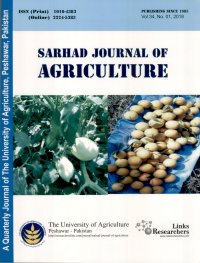Visitors’ Willingness to Pay for Conservation of the Biodiversity and Tourism in Kalam Valley of Khyber Pakhtunkhwa, Pakistan
Visitors’ Willingness to Pay for Conservation of the Biodiversity and Tourism in Kalam Valley of Khyber Pakhtunkhwa, Pakistan
Sanaullah1, Fazli Rabbi2*, Shahid Ali2, Zeeshan Khan3 and Muhammad Zamin4
ABSTRACT
This paper is based on a Contingent Valuation (CV) survey conducted in Kalam valley, which is a famous tourist and biodiversity hot spot. The valley has remained underdeveloped in terms of infrastructure, tourists’ information facilities, telecommunication, affordable public transport system, and comfortable accommodation for the tourists. In the past few years, the development of this tourists’ spot has been neglected in the public development budget. Moreover, due to the war against militancy in Swat, the frequency of tourists was declined in the valley. As a consequence, the livelihoods of the local population were adversely affected. As public financial resources for the development of the area have been meagre in the past, therefore, this study is aimed to estimate tourists’ Willingness to Pay (WTP) for development and biodiversity conservation. A well-structured interview schedule was used and face to face interviews were conducted with a total of 264 tourists. Travel Cost Method (TCM) and poisson regression techniques were used for data analysis. The results reveal that 98 percent of the sampled tourists were willing to pay for the development and conservation in the area. Moreover, 37 percent of the sampled tourists were willing to pay Rs.100 (0.94 US$) per visit as an entry fee. The analysis further showed that an estimated amount of 421 million Rupees (3.97 million US$) could be generated as consumer surplus. The poisson regression estimates show that visitors’ frequency to the site is significantly affected by traveling cost, gender, and visitors’ perception of the quality of the site. The policy should legislate to introduce payment system for visiting the tourist site to generate funds for its development. Moreover, development programs shall be initiated to attract tourists vis-à-vis realize the objectives of the sustainable management and conservation of biodiversity.
To share on other social networks, click on any share button. What are these?







